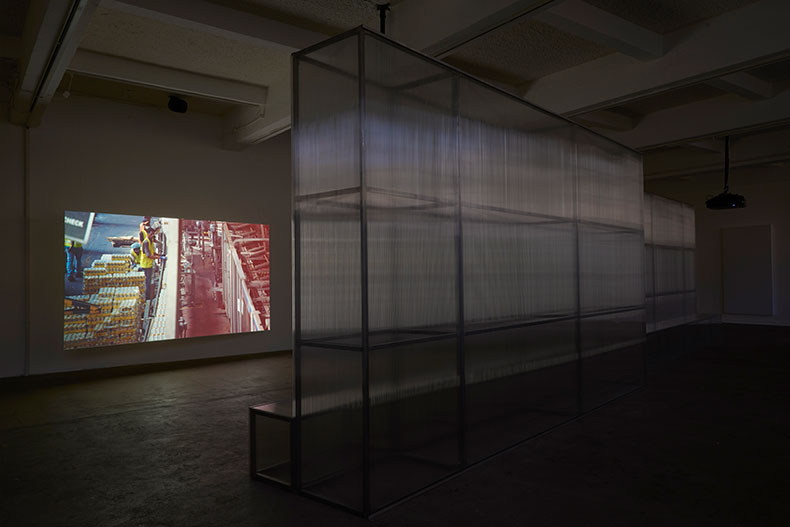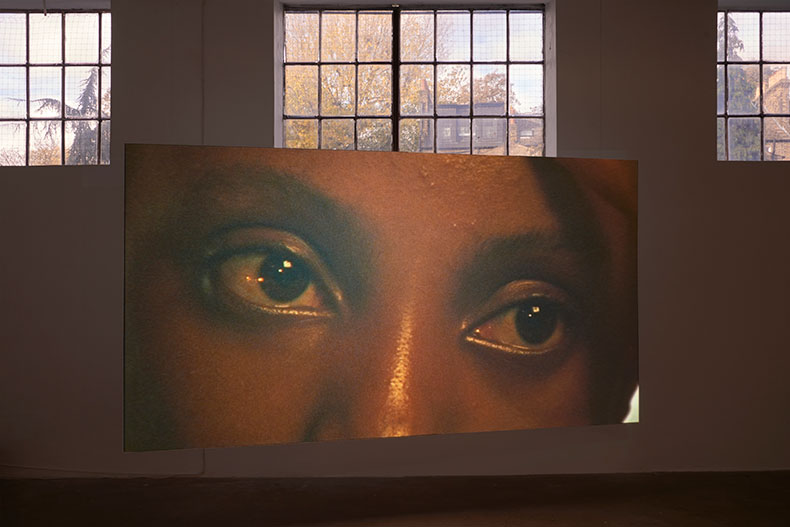In Faluyi (2022), one of two new short films by Ayo Akingbade currently on show at the Chisenhale Gallery in London, the camera momentarily rests on the word ‘Love’ printed on a red kitchen tablecloth. During The Fist (2022) the camera pauses on a sign demanding that factory workers ‘Do Not Drink’. These two found texts – one a term of deep affection, the other a cold and authoritative command – typify the contrasting tones of these films. Although their inclusion is simple, these words carry a vastness of association that echoes the complexity of ideas and emotion each film holds. Such economy is characteristic of Akingbade’s craft. Every moment she captures on camera is poignant and rich.
Shot on location in Nigeria using 16mm and 35mm film, Faluyi and The Fist are Akingbade’s largest productions to date. They play alternately on two screens within a gallery space that has been slashed diagonally in two by an industrial plastic and steel structure. This imposing architecture also provides seating and accentuates the factory-feel of Chisenhale’s gallery, itself a former brewery.

Installation view of The Fist (2022), Ayo Akingbade at Chisenhale Gallery, London. Photo: Andy Keate; courtesy the artist
The Fist is set in the first Guinness brewery to be built outside of Ireland and the UK, on the Ikeja industrial estate in Lagos – it opened shortly after Nigeria’s independence from Britain in 1960. It documents the workers’ arrival and follows the brewing processes, tracking conveyor belts and bottling systems through to the monolithic towers of crates finally leaving the factory. The film is methodical and its pace is meditative, with each expertly framed shot recording different parts of the vicinity. Like watching a slide projector, the film carousels from frame to frame, and many just-moving stills come to stick in the mind – an oozing white viscous run-off, a rack of filters slowly shunted back and forth, and shattered glass swept into order on a wet floor.
As memorable as the imagery is the film’s sonic texture, imposing a sense of the factory’s overbearing environment. The noises of pumps, rotaries and motion alarms collage throughout and all dialogue is drowned by a pounding watery thrum. As if aware of the incapacity to speak or be heard within this space, the lens leads your eye to wall signs and slogans. These implicate the labourers in taking responsibility for their own care. One reads, ‘This might be the last thing you see if you don’t wear eye protection.’ Another, printed on the uniformed back of a worker, reads, ‘I think safety always.’ Although some fleeting frames witness the staff joining in prayer or convening in the canteen, Akingbade’s camera is primarily fixed on the machines. The workers are secondary. Only moving in and out of shot, their hand is deemed largely invisible in this brewery’s work.

Installation view of Faluyi (2022), Ayo Akingbade at Chisenhale Gallery, London. Photo: Andy Keate; courtesy the artist
Faluyi, in comparison, centres the experience of an individual. Filmed on 16mm among the extraordinary boulder-like hills of Idanre in Ondo State, the film’s timbre is softer, dreamier, than the sharp focus of The Fist. A mere 14 minutes in length, with a restrained script and narrative, this ethereal vignette packs an unexpected range of emotions. Returning from school to be told of the passing of her father, the protagonist Ife visits a palm reader who tells her that her father, and his father, were good men. She celebrates with spirit dancers and musicians on a hilltop before motorbiking off into the future wearing a sparkling silver tasselled dress. Transforming from a tight portrait of pain into fantastically light scenes of joy and empowerment, this film reveals a well of feelings relating to grief, family and heritage.
The tenderness of Faluyi may be owing to the fact that it is set in the birthplace of Akingbade’s parents. But as the pairing of these films demonstrates, Akingbade has an impressive range: her drawing upon intimate experience for her work is as successful as when she turns a cold eye to her subject. Laying bare the workings of a Nigerian Guinness factory, Akingbade reveals labour politics and the force of words and language without resorting to didacticism. This is observation at its finest and while at first, they feel like documentary or archival fragments, Akingbade’s genre-evading films prove themselves to be truly expansive.
‘Show Me The World Mister’ is at Chisenhale Gallery, London, until 5 February 2023.













![Masterpiece [Re]discovery 2022. Photo: Ben Fisher Photography, courtesy of Masterpiece London](http://zephr.apollo-magazine.com/wp-content/uploads/2022/07/MPL2022_4263.jpg)
‘Like landscape, his objects seem to breathe’: Gordon Baldwin (1932–2025)